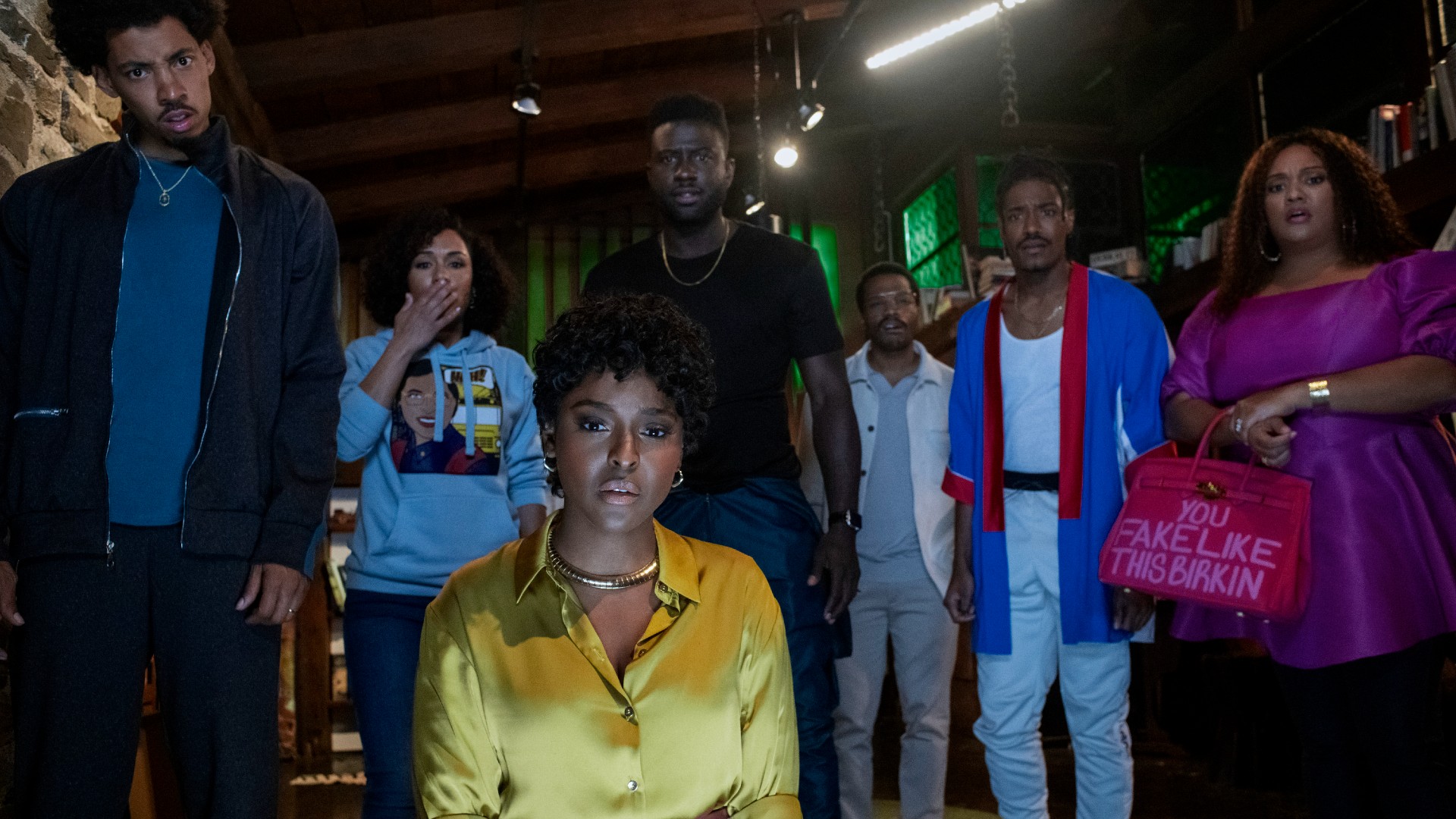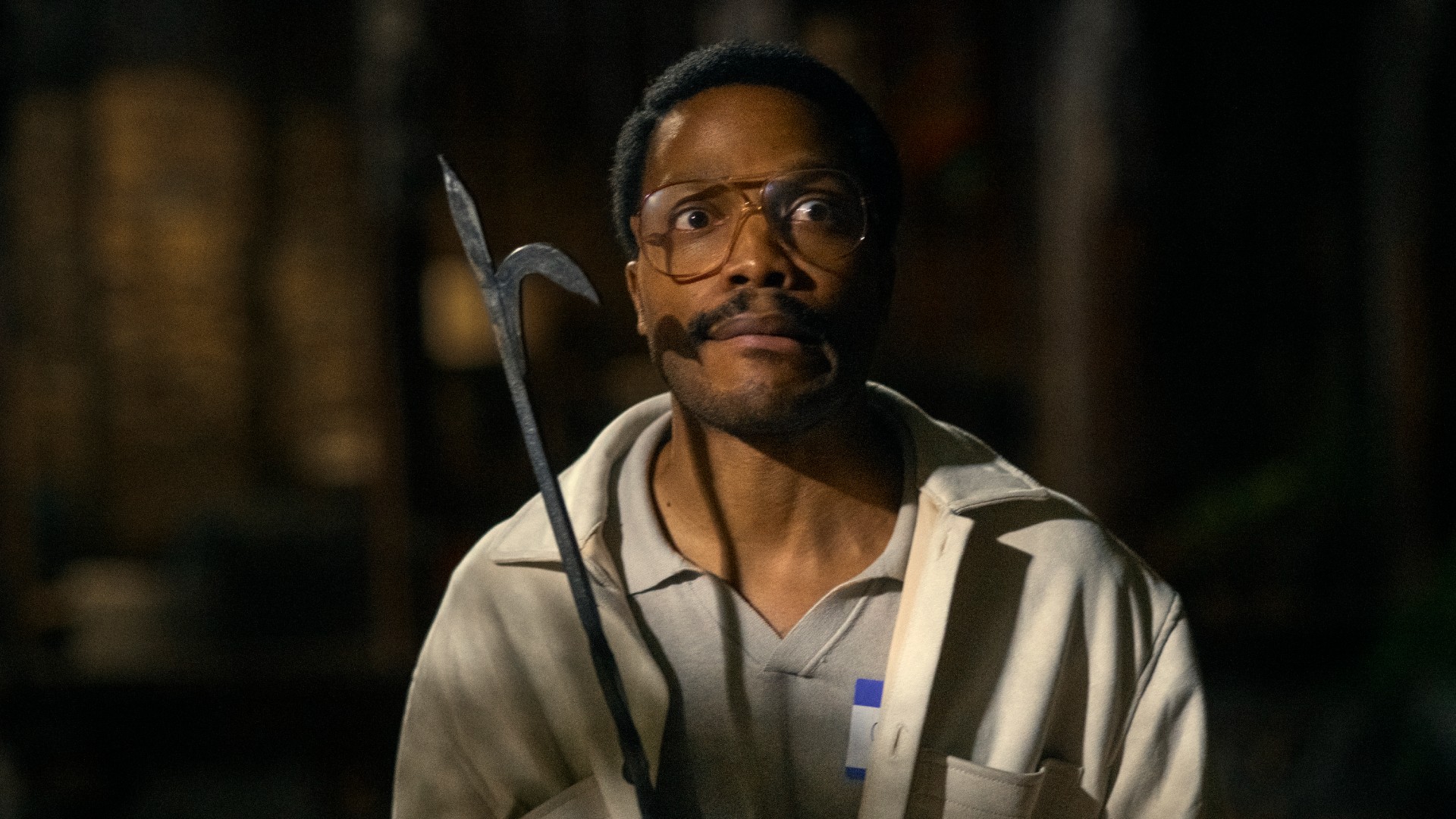
"I've always loved horror," The Blackening's Tracy Oliver tells GamesRadar+. "My dad showed me The Exorcist when I was a child, I don't know why but he did. It was traumatic – thank you, dad – but it was my first introduction to it and ever since then, I've loved all types of horror."
It's hardly surprising that the new horror comedy, from Barbershop director Tim Story, was penned by a genre fan. It quite literally stems from a well-known slasher trope; Black characters are usually the first to die. But what happens when all of your characters are Black? In an attempt to answer that, Harlem creator and Girls Trip writer Oliver teamed up with Dewayne Perkins to expand his viral Comedy Central sketch – which sees a bunch of people try to measure their Blackness, and determine their right to live or die accordingly – into a feature-length film.
"The thing about the short was, it was a really funny scene but I was like, 'We have to have a plot here and we have to figure out who these people are'. They were just types of Black people, they weren't fully realized characters with three dimensions yet," she explains. "So, it started there. Then I was just picking his brain, asking, 'Are these based on people? What are some of their quirks? Can we build in some kind of, you know, interrelationships between the group members?
"Then I taught him about structure and how movies work because he was new to all that, and we just spent like, an entire weekend together in a hotel… That sounds really creepy and inappropriate..." Oliver laughs, before sarcastically clutching her chest and fluttering her eyelashes: "'We spent this amazing weekend together', ha, no, we just came up with this movie literally in a weekend."
Starring Perkins, Grace Byers, Jermaine Fowler, Melvin Gregg, X Mayo, Antoinette Robertson, Sinqua Walls, The Blackening sees a bunch of college besties reunite at a remote chalet for a Juneteenth weekend. Things get off to an iffy start when a park ranger questions why the group is there – and become even more suspicious when they realize the first friends to arrive, Morgan and Shawn, are nowhere to be seen.
As they pick their bedrooms for the next couple of nights, some of 'em discover that one door in the property is locked. But when the lights go out and they start wandering around looking for a fuse box, they find it open. Inside the mysterious room is a racially-charged board game, The Blackening, which prompts the gang to engage in a heated Black trivia quiz – ("Name 5 Black actors who appeared in Friends", or "How many seasons did 'Dark Aunt Viv' do of Fresh Prince before being replaced by 'Light-skinned Aunt Viv'?") – and kicks off a deadly game of cat-and-mouse, too.

While the movie focuses way more on gags than gore – there's very little in the way of blood, in fact – Story revisited "all of the iconic historical movies" for inspiration, including Friday the 13th, Halloween, and Texas Chainsaw Massacre. For Oliver, it was Saw, Cabin in the Woods, and Scary Movie, though Wes Craven's Scream turned out to be hers and Perkins' biggest influence. "It's just fun, and Dewayne and I talked about it a lot throughout the process. We wanted to make something that people could go to in groups and have a good time with and just make it an experience," she explains. "I think that's what separates Scream from some of the more grounded, really dark horrors that are maybe too scary sometimes to totally enjoy in that kind of way. That's what we wanted to do with this tonally."
"It's one of those things where, in actually doing a horror film, you realize how much you actually do know about horror," Story recalls. "Just by being a film watcher, I'd watched a lot of horror films, so when you have to use that muscle in terms of making a movie, you kind of pull out an unexpected encyclopedia of what you remember about all the horror films you've seen. I probably wouldn't have said I was a horror fan before making this movie but now I can actually stand up and say, ‘You know, what? I'm pretty good, I know a few.'"
For Oliver and Perkins, playing around with stereotypes – not only from the horror genre, but within African-American culture as well – was imperative. Running jokes about Allison (Byers) being biracial, King (Gregg) being an "reformed" thug, and Dewayne (Perkins) being Lisa's (Robertson) self-righteous gay best friend prop up certain clichés, only to have their actions tear them down; Allison is the only one among the group who knows the second verse to the Black National Anthem, while Dewayne saves his pals on more than one occasion. Oliver says the real fun came, though, from constantly switching it up, like later on in the movie, when Allison suggests, as the others groan in disgust, that their odds of surviving the night will improve if they split up, a profoundly "white" thing to do.
"We wanted people to feel like these characters were familiar but at the same time, to act in ways that were surprising for the genre, and so you're not as frustrated with the choices they're making," she explains. "We tried to make them go against what people would typically do in these horror movies.
"I think there's a lot of meta stuff that we do, particularly with Dewayne's character being this, like, gay – I was gonna say heroine but I don't know if I can call him that – but that was something he was adamant about," adds Oliver. "He was like, 'I'm tired of the gay character being siloed, or being weak, or just being there for comedic relief. Don't get me wrong, he's hilarious but he's also very strong and smart and brave across the whole movie. Those were all very deliberate choices. But yeah, throughout, we were just looking at how to subvert those stereotypes in ways that audiences were not going to, you know, feel it's been done before."
Story allowed each actor a huge amount of freedom in their roles, from picking out their wardrobes to using personal experiences to help build their characterizations, which helped make them all feel more real. When casting, he purposefully tried to find people who "have to play a caricature or too much outside of who they were."

Story continues: "As long as I didn't see something wrong with it in terms of telling the story, I let them create these characters however they wanted. To a certain degree, they knew them better than I could ever know them, because they all seemed to be very personal to them."
But what about improv? "The great thing about starting off where we were, and what Tracy and Dewayne put together, is we had a very, very great script. So I found that the actors leaned on the script, as you would hope they would," says Story. "Then when it came down to anything that they wanted to throw on top of that, there was always room. Sometimes we'd stop a take and one of them would say something and I'd be like, 'You know what? Why don't we grab that?' I was like, 'If you have an ad lib, go for it.' They were so disciplined and had such good respect for their other cast mates, in not taking it too far off-line so that if another line from a cast member was coming up, it didn't get in the way, you know? So that was great."
Given how much Scream played a part in the making of The Blackening, it's no wonder our heroes are targeted by a masked killer. Like Ghostface's, Story knew the false face had to be instantly recognizable, though in this case it's all for the entirely wrong reasons.
"With the mask, as well as the game, we were looking to horrify but at the same time, disturb. We wanted to make it read as horrible and super offensive. At some point, we were like, 'How offensive can we make this mask to the guys playing the game?' I guess we were successful on that," he notes, chuckling. "I know there were a few occasions where I would show it to Tracy and go, 'Is it enough?' and Tracy would be like, 'Push it more Oh my god, it's horrible, go farther.'" We wouldn't expect anything less from a seasoned horror fan.
The Blackening releases in UK cinemas on August 23. For more, check out our list of the most exciting upcoming horror movies, or our ranking of the best horror movies of all time.







